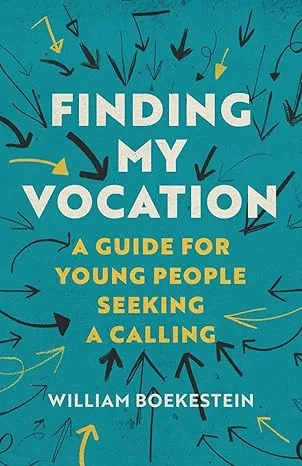How to Identify and Pursue the Right Vocation

Choosing can be scary. That is especially true when it comes to the matter of what you will do for the next several decades. You cannot map out your life. But don’t be intimidated. If you are a believer, you are in God’s care. He is faithful. He knows what is best for you and regularly redeems poor human choices.
Still, you must choose. And given the relative freedom that so many of us have today concerning our future work lives, it makes sense to seek a vocation that honors our skills, interests, and potential so that we can be useful in the world. Older Reformed writers seldom made much of vocational choice. In their day, personal freedom was a small factor in one’s vocational future. For most of us, that factor is greater. So, you must choose wisely.
Finding your vocational sweet spot requires several specific actions.
1. Be Well-Informed
A twelfth-century blacksmith’s son had little need to inquire about how to become a doctor, lawyer, or farmer. He would most likely become a blacksmith (a noble calling). In today’s world, school guidance counselors and curated employment lists can offer useful—and perhaps surprising—insights about careers that might be a good fit for you.
All things being equal, you should seek a calling that pairs well with your talents, training, and interests. What makes you you is a sacred trust that you must use to glorify God (see Rom. 12:6). One of the best ways to discover your gifts is often simply practice. Paul told Timothy to “fan into flame the gift of God” (2 Tim. 1:6). Fulfilling your duties in small responsibilities can help you figure out how to chart your course vocationally.
Other people can help. It is hard to admit, but we are prone to self-deception. Involving others in the church may be helpful in your career choice. Trusted advisors can help to identify talents you don’t notice or calm your passion for an impractical vocation. Be open to their suggestions, even if you feel certain that you already know what you want or don’t want to do. Their advice will not always be perfect, and it will be shaded by their own experiences. But it offers a less partial perspective than your own.
Given modern-day vocational freedom, you should begin by evaluating yourself and the fields that might become your lifelong occupation with the input of trusted advisors, committing the matter to God in prayer.
2. Aim High
The word ambition sometimes suggests a burning desire for fame or power. And this kind of ambition must be avoided in the search for a calling (see 1 Tim. 6:10, 17; John 12:43). Still, proper ambition has a role to play in selecting an occupation. You should choose the best vocation possible. This doesn’t mean that one kind of worker has greater value before the Lord, but some callings allow us to do more good than others. We will all have to give an account of how we have managed our lives, and to whom much has been given, much will be expected (Luke 12:48).
Biblical vocation is the aligning of the gifts God has given us, the Spirit’s guidance through self-examination and the input of other believers, providential opportunities, and divine assistance in wisely practicing our gifts.
You must ambitiously apply your unique talents to the providential opportunities you are afforded. You must “earnestly desire the higher gifts” (1 Cor. 12:31). Commenting on this passage, John Calvin says that Christians must “apply themselves the more diligently to those things which are most conducive to edification.”1 For Calvin, being a magistrate or politician was “by far the most honorable of all callings in the whole life of mortal man.”2 You might disagree. But appreciate Calvin’s argument; he lauded the magistracy because it has the potential to wield great influence for Jesus. Puritan John Cotton agreed with this logic. An ideal vocation is “fitted to me and my best gifts. For God . . . would have his best gifts improved to the best advantage.”3
So be biblically ambitious. But you also need to be practical.
3. Be Realistic
You must balance your ideals with providence—including personal limitations and actual opportunities. As one shouldn’t commence building a tower without counting the cost (Luke 14:28–30), so you shouldn’t embark on a career course without evaluating its potential for success. What you want to do might not be able to provide for yourself or your future family and may be better suited for a side job or a hobby.
Don’t worry. You don’t have to follow your passion or find that one special job you were made for. The wrong kind of vocational passion can lead you to blindly pursue your dreams regardless of the cost to yourself and others. Even proper passion often takes time to develop, usually in concert with growth in skills and the accumulation of experience. Be patient. While God knows what He has in store for us, He doesn’t always reveal His secrets to us. And we needn’t try to find them out. We just need to be faithful with what we know (Deut. 29:29).
Working near the intersection of passion and practicality is ideal. But after the fall, vocation is about service. Even in our callings, “It is more blessed to give than to receive” (Acts 20:35). You don’t have to start out, or even end up, absolutely loving what you do. As a Christian, you are not looking for ultimate fulfillment at work—you’ve found it in Christ. Your vocation isn’t how you will find yourself—you’ve found yourself in Jesus.
No matter what job you end up with, one of the most basic vocational blessings is that God directs you to a calling and does not permit “you to live an idle, useless and sinful life.”4
4. Trust God
You have to choose. But only God is sovereign. Sometimes He confronts us with callings whether we want them or not—think Esther or Jonah. And you can be faithful in whatever true calling you find yourself in as a believer (1 Cor. 7:17). You might not immediately find what you believe you were called to do. Still, with realistic hopefulness you should seek appealing work, eager to obey God’s will. Such an attitude can protect you from the paralysis often caused by the vast number of modern vocational choices and immunize you against the modern passion for keeping options open. Make a decision trusting that God is sovereign even in our vocational choices.
God’s sovereignty can help us accept callings we suspect will be hard—bearing and raising children, managing the family business, taking a lower-paying job to be near a faithful church. Still, because of God’s covenantal faithfulness, you can prayerfully choose but leave the results to the Lord. You don’t have to worry about success. Leave that to God, who is able to satisfy you no matter your situation.
You must make hard choices about your future. But don’t panic. After all, biblical vocation is the aligning of the gifts God has given us, the Spirit’s guidance through self-examination and the input of other believers, providential opportunities, and divine assistance in wisely practicing our gifts.5 Care about the needs of your neighbors. Seek opportunities. Be committed to using your talents. Practice faith in Christ, whose righteousness gives you the freedom to work for the good of your neighbor. And trust that behind your choices is the ever-faithful working of a loving God.
-
John Calvin, Commentary on 1 Corinthians (Grand Rapids, Mich.: Christian Classics Ethereal Library, 1848), 346. ↩
-
John Calvin, Institutes of the Christian Religion (Philadelphia: Westminster Press, 1960), 4.20.4. ↩
-
John Cotton, “Christian Calling,” in The American Puritans: Their Prose and Poetry, ed. Perry Miller (Garden City, NY: Anchor Books, 1956), 174–75. ↩
-
John Flavel, The Mystery of Providence (Carlisle, PA: The Banner of Truth Trust, 1985), 75. ↩
-
John Frame, The Doctrine of the Christian Life: A Theology of Lordship (Phillipsburg, NJ: P&R Publishing, 2008), 312–13. ↩



